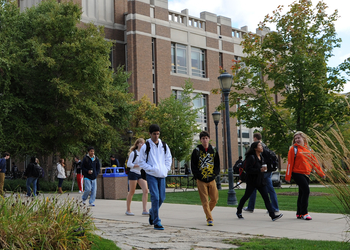- About Marquette
- Catholic and Jesuit
- Mission
- Vision
- Guiding values
- Strategic planning
- Leadership
- Participating faculty policies and procedures
-
PROBLEM WITH THIS WEBPAGE?
Report an accessibility problem
To report another problem, please contact brandon.richardson@marquette.edu.
Frequently Asked Questions
Addressing Concerns
How can participating faculty trust that senior leadership “gets it” and will meaningfully address their concerns?
The proof is in the work completed by the Participating Faculty Task Force and that continues to be underway through the Participating Faculty Committee.
I would like to have my voice heard on these matters. Who can I talk to?
As always, you can bring any concerns to Dr. Gary Meyer, chair of the Participating Faculty Committee. Of course, please also feel free to share your feedback with your department chair or dean. You may also share your input via the Your Voice section on this website.
Faculty Unionization
Would Marquette leadership support a vote on unionization?
Over the years, there have been some discussions among participating faculty regarding the possibility of forming a union. Marquette leadership believes that our community is best served by working collaboratively and without a third party. That said, Marquette leadership has repeatedly stated that it will follow a lawful process that protects the rights of all parties, as defined by the National Labor Relations Act, should participating faculty decide they want to form a union.
What if participating faculty don’t want to be in a union? What can/should they do?
Everybody has a voice in this discussion. Just like participating faculty members can support unionization, they also have the right to oppose it. How they choose to express that is up to them. It is also important that participating faculty know what they’re being asked to sign. Paid union organizers or interested faculty members are already asking participating faculty to sign a “union card” or an “authorization card.” This could be a cardboard notecard, a piece of paper or an online document. While the wording sometimes varies, by signing the card, participating faculty are agreeing to be represented exclusively by the union, whether they realize it or not. participating faculty should carefully read the entire document to be sure they understand whether they are simply indicating support (like a petition) or are agreeing to have the union represent them and use their names to have the National Labor Relations Board (NLRB) hold an election.
Why should participating faculty care if their colleagues want to unionize, even if they don’t?
Once the NLRB establishes which employees are in the collective bargaining unit, an election will be held to decide whether a majority of the voting employees want a union. If a union is certified, everyone in the designated bargaining unit will be subject to the terms of the contract that eventually will be negotiated between the union and the university. Individual employees cannot opt out of the union representation.
If participating faculty do not want a union, why should they vote?
In a union election, the decision to unionize or not is made by a simple majority of those who voted. In a hypothetical example, let’s assume 100 people are eligible to vote. Of those 100, only 20 people show up to vote and a simple majority vote “yes” to form a union. That means that 11 people will have determined the outcome for all 100. If we have a vote, everyone in the proposed bargaining unit will be impacted by the outcome. Therefore, it will be important that everyone has their vote count.
What would it be like having a faculty union at Marquette?
In general, individual participating faculty members will no longer be able to negotiate directly with department chairs, program directors or deans on terms that are subject to the union contract, even if the individual faculty member did not vote for the union or join the union. In addition to surrendering the right to work directly with the university about their employment, participating faculty who choose to join the union will likely be required to pay an initiation fee and monthly dues. Participating faculty who choose not to join the union will still be represented by the union and subject to the collective bargaining agreement.
How would unionization impact Marquette’s system of shared governance?
Unionized employees will not be represented within our governance system because only the union would have the exclusive right to bargain over employment terms. That means that the university could no longer make changes to compensation, work environment, etc. without first negotiating with the union.
How are union contracts bargained?
The first contract typically takes 18-24 months to negotiate. From there, new contracts are typically negotiated every three to five years.
Can one department or group of employees simply “opt out” of being in the bargaining unit and covered by a union contract?
No. If a union is voted in, it will represent all participating faculty in the bargaining unit whether they want to be in it or not. A bargaining unit is a group of employees with a clear and identifiable “community of interests,” which means they have similar job duties, employment locations, etc. Other than through voting, the employees themselves have no say about whether they are included in the bargaining unit and cannot opt out if a union is voted in.
What if a union is voted in, but participating faculty decide they no longer want one?
If a union is voted in, then it will remain in place for a minimum of 12 months. After that point, if members of the bargaining unit decide they no longer want a union, they may begin what is called a “decertification process.” A special election will be called, with a simple majority vote determining whether or not to decertify the union. Marquette, as the employer, has no role in the process and cannot provide any assistance to the bargaining unit’s efforts.
